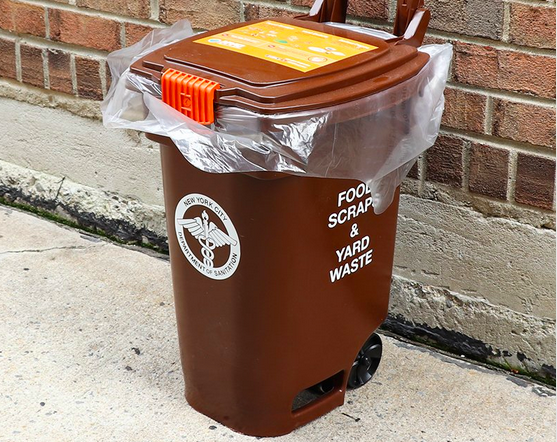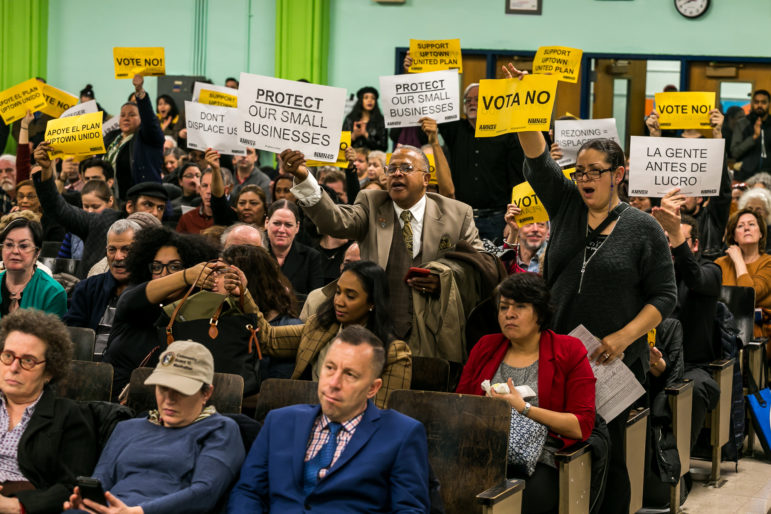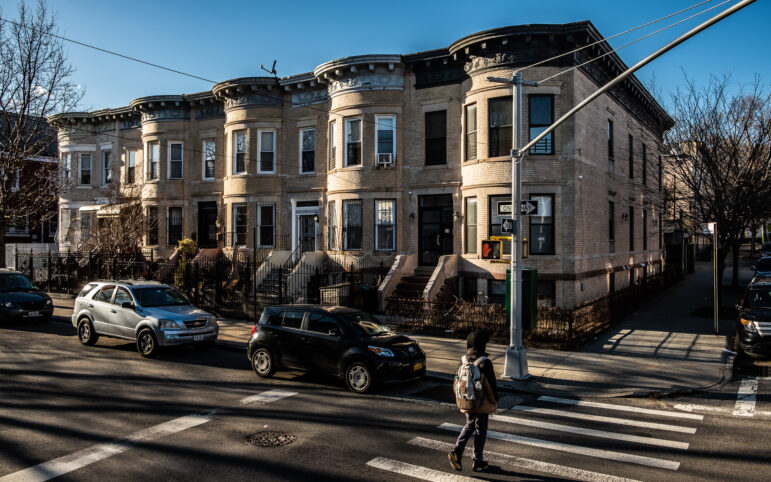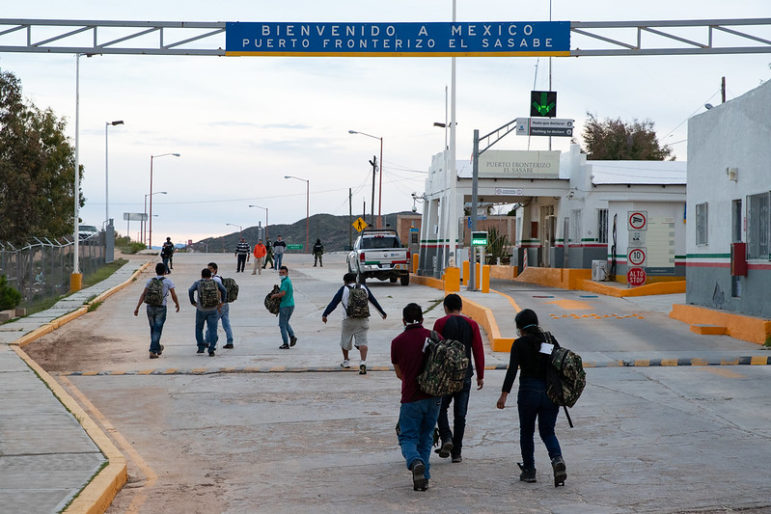
As we experience unseasonably warm temperatures in New York City this fall, we are reminded again that climate change is not just a future threat but a present reality. Record hot temperatures were reported across the globe this summer — from Algeria (124 degrees) to Montreal (97.9 degrees) to Portugal (112 degrees). Hurricane Florence just delivered record rainfall and damage to the Carolinas, the latest region of the U.S. to experience historic harm from a hurricane in the past year alone. Forest fires – unprecedented in size and scope – have scalded large parts of the West. Here in New York City we experienced several debilitating heatwaves this summer and our city has still not fully recovered from Superstorm Sandy’s coastal flooding almost six years ago. All the while, rising sea levels and more frequent storm surges mean that parts of our city will be underwater in the decades to come.
Tackling this crisis requires creative thinking and coordinated efforts, both big and small. One way that New Yorkers can act locally to mitigate climate change is by adopting smarter, more sustainable waste disposal practices. Food waste is a huge component of our city’s waste stream, accounting for 34 percent of New York City’s residential garbage.
Food waste contributes to climate change by emitting methane – a potent greenhouse gas – as it decomposes in landfills. Instead of throwing food scraps in the trash, composting is a sustainable alternative that ensures this resource is recycled into fertile soil that can be used for farming and home gardens, or used to generate biofuels that can be used in place of traditional fossil fuels.In New York City, some of our food waste is taken to facilities like the Newtown Creek Wastewater Treatment Plant, where it is broken down through a natural process and the byproducts used for biogas – a natural energy source that we can use in our daily lives. In fact, a new partnership with National Grid will ensure that much of this renewable natural gas will be pumped into our electric grid to heat homes and businesses.
New York City’s residential organics collection program is designed to meet the challenge of climate change. The Department of Sanitation has been seeking to collect compostable food waste from over one million households across the five boroughs. This worthy initiative has grown under New York City’s Department of Sanitation Commissioner Kathryn Garcia. But participation has been voluntary, the program has faced start-up strains, and the City’s food and yard waste collection trucks have been finishing their runs without full loads.
In response, the de Blasio Administration has paused plans for expanding curbside organics collection to additional neighborhoods across the city. Given the inevitable and impending climate crisis before us, this is a step in the wrong direction. If the City wants its sensible organics collection strategy to succeed, it must enhance this program by increasing public education, addressing residents’ concerns in communities that already have curbside food waste service, and boosting collection efficiency.
We recently worked together to introduce a bill in the City Council that could help fill the Department’s food waste collection trucks. It would require that all City agency buildings participate in the organic waste collection program.
Our public servants should be leaders on this issue and help move our City towards greater sustainability and responsibility. Educating and training over 300,000 municipal employees to separate food waste for composting is needed to propel a cultural shift throughout the city and improve the efficiency of the curbside organics program.
If this legislation is enacted, it will reduce New York City’s global warming emissions and get us closer to achieving the de Blasio administration’s Zero Waste by 2030 goals, while also saving taxpayer dollars.
Organics collection should also be expanded to other big municipal waste generators, like CUNY and Health and Hospitals Corporation buildings, so that all such facilities are properly disposing of their food waste. This would engage the next generation and ensure greater sustainability across a broad array of public institutions.
We’ll never tackle the climate challenge unless we begin with simple steps like separating our food and yard waste and turning this trash into useful compost and clean energy. Employees in our city agencies should lead the way.
Letitia James is the public advocate for the city of New York and the Democratic nominee for state attorney general. Eric A. Goldstein is a senior attorney and the New York City Environment Director with the Natural Resources Defense Council (NRDC).









13 thoughts on “CityViews: NYC Can Fight Climate Change at the Curbside”
Those food waste bins invariably generate foul odors. Food Waste collection hasn’t reached my S.I. neighborhood yet. If and when it does I’m not going to participate because I don’t want to stink up my block. I gladly separate my trash but won’t bother with this nonsense. Some of the suggestions are comical, like storing food waste in our freezers.
BTW, doesn’t sending out huge garbage trucks to collect food waste negate any so-called environmental benefit??
SI, the avoided methane emissions from organic waste diversion greatly outweigh the extra transportation emissions – life-cycle emissions models such as EPA WARM can attest to this. I’m not sure why food waste bins would generate any more odor than your trash bin, as the waste is going to be sitting out either way? Unless perhaps you are concerned that food waste collection would be less frequent than trash collection? I personally do store my compost in my freezer and put it in the green bin the day before collection. This keeps my indoor and outdoor trash completely odor, bug, and mess free. I only have to empty my (small) kitchen trash once every few weeks, as there are no odors building up from rotting food! I do hope you reconsider participation if you have the opportunity some day.
About the “foul odors,” the compost collection bins actually have latches on them to seal them shut, so you won’t smell a thing! The bins are actually great designs that are much more innovative than any other city bin.
About storing food waste in the freezer, it’s one way to keep the food scraps from bio degrading by themselves, keeps them from stinking up your kitchen and also keeps the pests away.
About the garbage trucks, you should think about the benefit of food scraps going to a composting site instead of a landfill and sitting there for longer than we can imagine. That benefit will not only make our communities for sustainable, but it will actually save tax payers money!
Thanks SI resident for what can only be called a brilliant comment. As is well known Staten Island (the Island of Inhibited Reductase in Dutch) residents have been held hostage by a flock of wild turkeys since 2009, thus you and your fellow island inhabitants might not be up on some of the latest news. Global warming has been in the news of late and I’m sure your wild turkey overlords likely have kept this from you as they require you to bring them popcorn all day long. So here is the skinny on this global warming: the globe is getting warmer, alarmingly so, due to human ( not wild turkey) activity. Now it has been postulated by scientists that methane is one ( but the only one) of the greenhouse gases produced by human activity. Your organic waste produces, when sent to landfill or incinerator, produce methane and or CO2. properly composted those gases are reduced and nutrients are recaptured to help that next crop of veggies grow without the carbon footprint of artificial fertilizer. Now you say your block will smell because of organics in bins waiting for pick up! But currently your block doesn’t smell now because the organics are picked up but mixed with all your other garbage. Review this in your mind for a few moments or better yet consult with your wild turkey overlords on this. Finally carbon footprint from extra pickups from trucks. Good point, but wrong. We can discuss this later I’m tired now.
I put my food scraps into the brown can. Odors emit, maggots and flies develop. Can is emptied into the truck with all other garbage. What’s the point if Sanitation doesn’t follow up on their end of the deal?
You’ve really seen DSNY dump the brown bin into a regular truck, with other refuse? Do you remember where and when?
Has sanitation not held up your end of the deal? And yes, odors will develop anywhere you place garbage in, whether it’s landfill garbage, recyclables or food scraps. Make sure that your brown bin is actually sealed shut to keep the odors from emitting and keeps any pests away. It’s actually a really good system. I use it all the time!
Oy vey, not since the the sinking of the Titanic has a potential future candidate for mayor had a worse navigator at their side, guiding the ship of state for a potential public policy failure.
The LES Ecology Center has offered community based composting programs in NYC since 1990 by collecting food scraps from NYC residents and turning them into compost, a soil amendment, locally. We have used the resulting compost to turn a rubble filled city owned lot into a thriving, green open space. This closed loop systems shows how we can improve our neighborhoods, and raises awareness about composting and its many positive impacts for our environment. We have to get beyond the old stereotypes such as composting is a smelly mess – climate change is real and it is urgent that we implement programs, big and small now, that provide solutions to the causes of climate change.
Climate science is compelling but because it requires people to change behaviors, it is complicated by our heuristics and selfishness. Recycling food waste is a modest burden with the potential to create new jobs, save taxpayer money and hopefully contribute to saving our planet.
Everything eventually seems to circle back to committment or a perceived lack thereof around residential organics diversion. Many cities and states are currently experiencing major problems hooking up the “last mile”, building adequate infrastructure capacity, and revising budget priorities due to the sticker shock around organics processing costs.
My opinion is given that the cities residential organics collections will only slightly move the needle on overall organics diversion it’s best to take a more measured and thorough approach using media, education and outreach in order to phase in an eventual mandatory residential organics separation program. Yes, every little bit diverted is good but should be accomplished intelligently and contaminant-free.
Capturing and diverting commercial/industrial and institutional organics is the more pressing problem driving GHG emissions, imho.
And then there are the racoons. But these are the pests we want to have over the more ominous threat posed by rats dining on black trash bags.
Marc Shifflett
(To fully disclose I Chair the Organics Committee for the Manhattan Solid Waste Advisory Board. The comments expressed are my own and do not reflect the opions of the MSWAB or its members.)
So many cities have separate containers for recycling paper, glass and plastic. Why not start there? It would also make sense to turn to the organizations already collecting food waste and sub-contract to them. They could, in turn, work with the various public and private manpower initiatives to organize neighborhood pick-ups and make sure they have enough workers. And there are bins made that are bear-proof; seems like we should be able to make something lightweight but rodent-proof.
While I commend the rational arguments made above by folks like KrumMon and Marc Shifflett and Christine Datz-Romera, our Staten Island troll has already shifted Overton Window to the baffoon side of the spectrum. So here are some extreme views in the opposite direction.
Consider that citizens of South Korea pay for every kilogram of food waste, recycling and landfill debris they create. I know, some of you are thinking that South Korea is a devil spawn, communist state out to eat our babies, and since you are always right,I’ll point out that at least they will make bone broth and offal so they don’t have to pay for discarding the waste eating said babies inevitably creates. Also, any person unwilling to responsibly deal with their own waste is guilty of environmental classism/racism. If you disagree with that, then based on your own logic, I call into question your personal right to food access… and I challenge you to a duel.
*Disclaimer, I also work for a composting thing, these views are mostly meant for comical/hypocritical purposes and do not reflect that of my employer